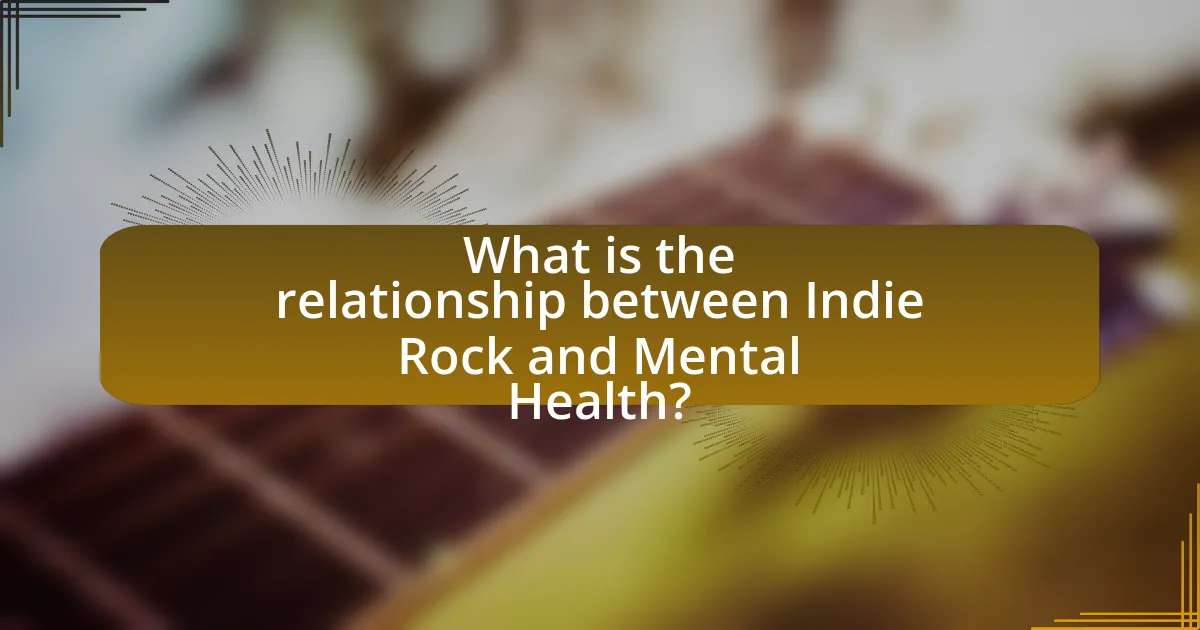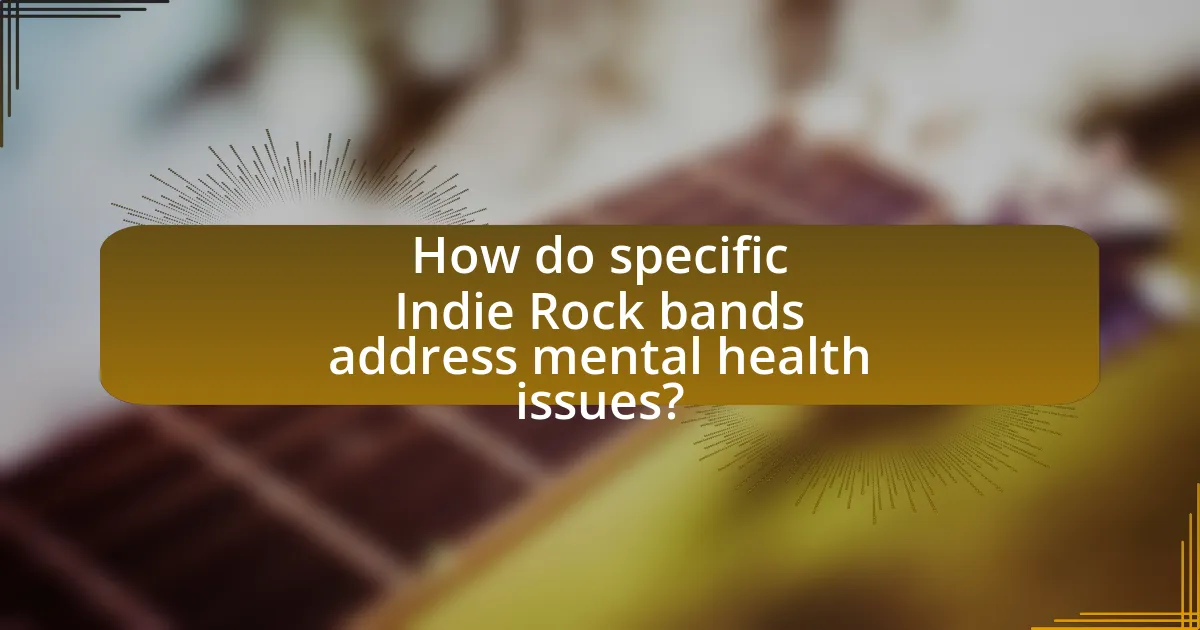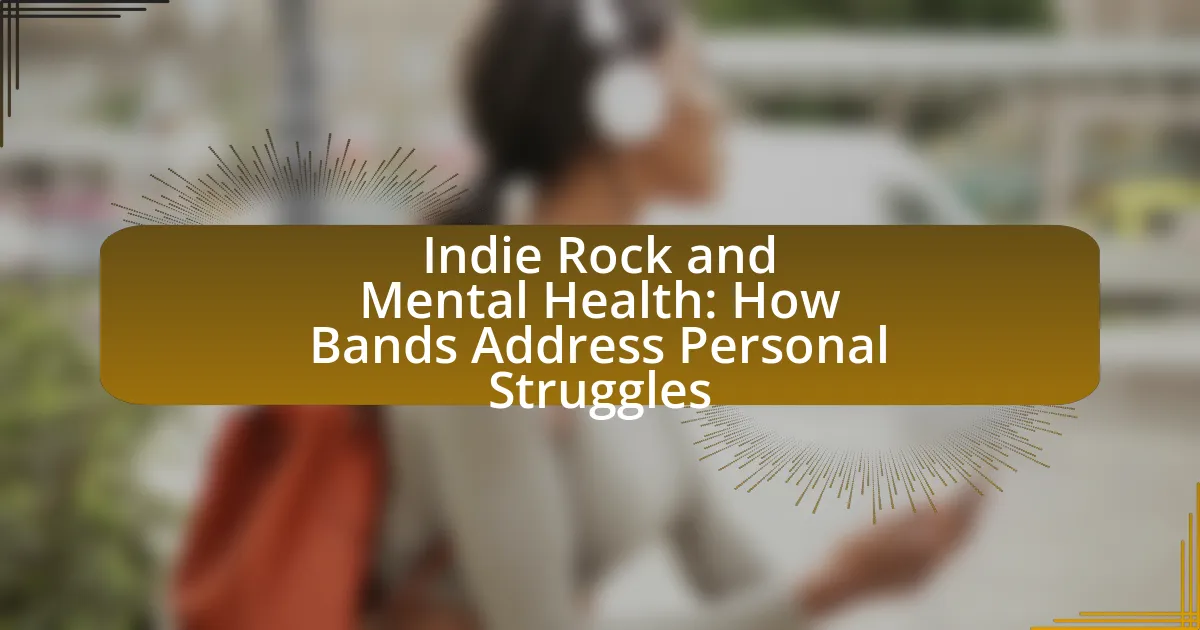The article explores the relationship between Indie Rock and mental health, highlighting how artists within the genre express personal struggles through their music. It discusses common themes such as anxiety, depression, and existential crises found in the lyrics of bands like The National and Death Cab for Cutie, emphasizing the emotional impact of musical elements. The article also examines the evolution of mental health perceptions within the Indie Rock community, the role of vulnerability in fostering connections with listeners, and the broader implications of these discussions for societal attitudes towards mental health. Additionally, it provides insights into coping strategies suggested by bands and resources available for fans seeking help with mental health issues.

What is the relationship between Indie Rock and Mental Health?
Indie Rock often serves as a medium for artists to express and explore mental health issues, creating a direct relationship between the genre and mental well-being. Many Indie Rock songs address themes such as anxiety, depression, and personal struggles, allowing both artists and listeners to connect through shared experiences. For instance, bands like The National and Death Cab for Cutie frequently incorporate lyrics that reflect emotional turmoil, which can foster a sense of understanding and community among fans. Research indicates that music, including Indie Rock, can have therapeutic effects, helping individuals process their emotions and cope with mental health challenges.
How do Indie Rock bands express personal struggles in their music?
Indie Rock bands express personal struggles in their music through introspective lyrics, emotional melodies, and raw instrumentation. These elements allow artists to convey feelings of anxiety, depression, and existential crises, often drawing from their own life experiences. For instance, bands like Death Cab for Cutie and The National frequently explore themes of heartbreak and mental health in their songs, using specific narratives and imagery that resonate with listeners. This approach not only personalizes their struggles but also fosters a sense of connection with audiences who may share similar feelings, thereby validating their experiences.
What themes related to mental health are commonly found in Indie Rock lyrics?
Common themes related to mental health found in Indie Rock lyrics include anxiety, depression, isolation, and existential struggles. These themes are often explored through personal narratives and emotional vulnerability, reflecting the artists’ own experiences or observations. For instance, bands like Radiohead and The National frequently address feelings of alienation and despair, resonating with listeners who may share similar struggles. The prevalence of these themes highlights the genre’s focus on introspection and the complexities of mental health, making it a significant aspect of Indie Rock’s lyrical content.
How do musical elements enhance the emotional impact of these themes?
Musical elements enhance the emotional impact of themes in indie rock by utilizing dynamics, melody, harmony, and rhythm to evoke specific feelings. For instance, the use of minor keys often conveys sadness or introspection, while major keys can evoke happiness or hope. Additionally, varying dynamics, such as soft verses followed by powerful choruses, create a contrast that emphasizes emotional peaks and valleys, effectively mirroring the complexities of mental health struggles. Research indicates that tempo can also influence emotional responses; slower tempos may evoke feelings of melancholy, while faster tempos can generate excitement or urgency. These elements work together to create a soundscape that resonates with listeners, making the themes of personal struggles more relatable and impactful.
Why is mental health a prevalent topic in the Indie Rock genre?
Mental health is a prevalent topic in the Indie Rock genre because artists often use their music as a medium to express personal struggles and emotional experiences. This genre, characterized by its authenticity and introspective lyrics, allows musicians to explore themes of anxiety, depression, and existential crises. For instance, bands like Radiohead and The National have openly addressed mental health issues in their songs, resonating with listeners who share similar feelings. The rise of social media has further amplified this trend, as artists connect with fans and foster discussions around mental health, making it a central theme in their work.
What historical or cultural factors contribute to this focus?
The historical and cultural factors contributing to the focus on mental health in indie rock include the genre’s roots in countercultural movements and the personal narratives of artists. Indie rock emerged in the 1980s and 1990s as a response to mainstream music, often reflecting themes of alienation and introspection. This backdrop fostered an environment where artists felt empowered to explore personal struggles, including mental health issues. For instance, bands like Nirvana and Radiohead have openly addressed depression and anxiety in their lyrics, resonating with listeners who share similar experiences. The rise of social media has further amplified these discussions, allowing artists to connect with fans and destigmatize mental health conversations.
How has the perception of mental health evolved within the Indie Rock community?
The perception of mental health within the Indie Rock community has evolved significantly, shifting from stigma and silence to openness and advocacy. Historically, many artists in this genre faced societal pressures that discouraged discussions about mental health, often leading to personal struggles being hidden. However, in recent years, prominent Indie Rock musicians have begun to openly share their experiences with mental health issues, fostering a culture of acceptance and support. For instance, artists like Phoebe Bridgers and Sufjan Stevens have candidly addressed their mental health challenges in their music and interviews, which has encouraged fans and fellow musicians to engage in conversations about mental well-being. This shift is evidenced by increased visibility of mental health themes in lyrics and the growing number of benefit concerts and initiatives aimed at raising awareness and funds for mental health organizations.

How do specific Indie Rock bands address mental health issues?
Specific Indie Rock bands address mental health issues through their lyrics, public discussions, and advocacy efforts. For example, the band Death Cab for Cutie often explores themes of depression and anxiety in their songs, such as in “I Will Follow You into the Dark,” which reflects on loss and emotional struggles. Similarly, the band The National openly discusses mental health in interviews and their music, with songs like “Sorrow” directly addressing feelings of despair. Additionally, bands like Paramore have been vocal about their experiences with mental health, with lead singer Hayley Williams discussing her struggles with anxiety and depression, thereby raising awareness and encouraging fans to seek help. These approaches not only provide a platform for dialogue but also help destigmatize mental health issues within the music community.
Which bands are known for their candid discussions of mental health?
Bands known for their candid discussions of mental health include Linkin Park, The National, and Paramore. Linkin Park’s lyrics often explore themes of depression and anxiety, particularly in their album “Meteora,” which addresses personal struggles and emotional turmoil. The National frequently delves into mental health topics in their music, with songs like “Sorrow” reflecting on feelings of despair. Paramore’s frontwoman Hayley Williams has openly discussed her mental health journey, especially in her solo work, highlighting issues such as anxiety and self-acceptance. These bands contribute significantly to the conversation around mental health through their music and public discussions.
What personal experiences do these bands share in their music?
Indie rock bands often share personal experiences related to mental health struggles, such as anxiety, depression, and feelings of isolation. For instance, bands like The National and Death Cab for Cutie frequently explore themes of heartbreak and existential dread in their lyrics, reflecting their own battles with mental health issues. The National’s album “Sleep Well Beast” delves into the complexities of relationships and personal turmoil, while Death Cab for Cutie’s “Transatlanticism” captures the emotional weight of distance and longing. These shared experiences resonate with listeners, creating a sense of community and understanding around mental health challenges.
How do fans respond to these mental health themes in their work?
Fans respond to mental health themes in indie rock music with a mix of empathy, relatability, and support. Many fans express their personal experiences and struggles through social media, sharing how the music resonates with their own mental health challenges. For instance, studies show that fans often find solace in lyrics that address anxiety and depression, leading to a sense of community among listeners who feel understood. This connection is evidenced by the proliferation of online forums and fan groups dedicated to discussing these themes, highlighting the impact of the music on their emotional well-being.
What role does vulnerability play in the music of these bands?
Vulnerability serves as a central theme in the music of indie rock bands, allowing artists to express personal struggles and emotional depth. This openness fosters a connection with listeners, as it resonates with shared experiences of mental health challenges. For instance, bands like Death Cab for Cutie and The National often explore themes of heartbreak, anxiety, and existential dread in their lyrics, creating a relatable narrative that encourages listeners to confront their own vulnerabilities. Research indicates that music addressing personal struggles can lead to emotional catharsis and a sense of community among fans, reinforcing the importance of vulnerability in the genre.
How does vulnerability resonate with listeners facing similar struggles?
Vulnerability resonates with listeners facing similar struggles by fostering a sense of connection and understanding. When artists express their personal challenges through their music, it creates an emotional bond that listeners can relate to, validating their own experiences. Research indicates that music with themes of vulnerability can lead to increased feelings of empathy and support among listeners, as evidenced by a study published in the Journal of Music Therapy, which found that individuals often feel less isolated when they hear others articulate their struggles. This shared experience can empower listeners, encouraging them to confront their own issues and seek help, ultimately contributing to a sense of community among those facing similar mental health challenges.
What impact does this vulnerability have on the band’s image and success?
The vulnerability displayed by a band regarding mental health can significantly enhance their image and success by fostering authenticity and relatability. When bands openly address personal struggles, they resonate with fans who may experience similar issues, creating a deeper emotional connection. For instance, artists like Florence Welch of Florence + The Machine have openly discussed their battles with anxiety and depression, which has not only garnered public empathy but also increased their fan base and ticket sales. This openness can lead to a more loyal following, as fans appreciate the honesty and vulnerability, ultimately contributing to the band’s overall success in the competitive indie rock scene.
What are the broader implications of Indie Rock’s approach to mental health?
Indie Rock’s approach to mental health promotes open dialogue and destigmatization of mental health issues. This genre often addresses personal struggles through lyrics and public discussions, encouraging listeners to confront their own mental health challenges. For instance, artists like Phoebe Bridgers and Sufjan Stevens openly share their experiences with anxiety and depression, which resonates with fans and fosters a sense of community. This cultural shift not only normalizes conversations about mental health but also inspires advocacy for mental health resources, as seen in initiatives like the “Mental Health Awareness Month” campaigns supported by various Indie Rock artists.
How does Indie Rock influence societal perceptions of mental health?
Indie Rock influences societal perceptions of mental health by normalizing discussions around emotional struggles and mental illness through its lyrics and themes. Many Indie Rock artists openly address their personal experiences with mental health issues, which helps to destigmatize these topics and encourages listeners to engage in conversations about their own mental health. For instance, bands like The National and Death Cab for Cutie have explored themes of depression and anxiety in their music, resonating with audiences and fostering a sense of community among those facing similar challenges. This representation in music contributes to a broader cultural acceptance of mental health discussions, as evidenced by increased public awareness and advocacy for mental health resources in recent years.
What messages are conveyed through the music that challenge stigma?
Music in the indie rock genre often conveys messages that challenge stigma surrounding mental health by promoting openness and vulnerability. Bands like The National and Death Cab for Cutie address themes of anxiety, depression, and personal struggles in their lyrics, encouraging listeners to confront their feelings rather than hide them. For instance, The National’s song “Sorrow” explicitly discusses the weight of emotional pain, while Death Cab for Cutie’s “I Will Follow You into the Dark” explores themes of love and loss, fostering a sense of shared experience. These messages help to normalize conversations about mental health, reducing stigma and encouraging individuals to seek help and support.
How do these messages promote awareness and understanding?
Messages in indie rock music promote awareness and understanding of mental health by openly addressing personal struggles and emotional experiences. By sharing authentic narratives, bands create a connection with listeners who may face similar challenges, fostering a sense of community and support. For instance, lyrics that discuss anxiety, depression, or trauma can validate the feelings of individuals, making them feel less isolated. Research indicates that music can serve as a therapeutic tool, enhancing emotional expression and facilitating conversations about mental health, which is crucial for reducing stigma and encouraging help-seeking behavior.
What can listeners learn from Indie Rock bands about coping with mental health issues?
Listeners can learn that Indie Rock bands often address mental health issues through their lyrics and personal narratives, promoting openness and vulnerability. Many bands, such as The National and Death Cab for Cutie, explore themes of anxiety, depression, and existential struggles in their music, which can help listeners feel less isolated in their own experiences. Research indicates that music can serve as a therapeutic tool, with studies showing that engaging with emotionally resonant songs can facilitate emotional processing and coping strategies. For instance, a study published in the Journal of Music Therapy found that music can significantly reduce symptoms of depression and anxiety, reinforcing the idea that Indie Rock’s candid exploration of mental health can provide both comfort and understanding to listeners.
What strategies do bands suggest for dealing with personal struggles?
Bands suggest several strategies for dealing with personal struggles, including open communication, seeking professional help, and using music as a therapeutic outlet. Open communication among band members fosters a supportive environment, allowing individuals to express their feelings and challenges. Seeking professional help, such as therapy or counseling, is often recommended to address deeper mental health issues. Additionally, many bands emphasize the importance of using music as a means of processing emotions, as songwriting can serve as a powerful tool for self-reflection and healing. These strategies are commonly discussed in interviews and articles, highlighting their effectiveness in managing personal struggles within the music industry.
How can fans apply these insights to their own lives?
Fans can apply insights from indie rock bands addressing personal struggles by recognizing the importance of vulnerability and open expression in their own lives. By embracing the themes of mental health and emotional honesty found in the lyrics and stories of these bands, fans can foster a supportive environment for themselves and others. Research indicates that sharing personal experiences can lead to improved mental well-being, as seen in studies published in the Journal of Health Psychology, which highlight the benefits of self-disclosure in reducing anxiety and depression. Thus, fans can actively engage in conversations about mental health, seek help when needed, and create communities that prioritize emotional support, mirroring the messages conveyed by their favorite artists.
What resources are available for fans seeking help with mental health issues?
Fans seeking help with mental health issues can access various resources, including hotlines, support groups, and online platforms. For instance, the National Alliance on Mental Illness (NAMI) offers a helpline that provides information and support. Additionally, organizations like Mental Health America and the Substance Abuse and Mental Health Services Administration (SAMHSA) provide resources and referrals. Online platforms such as 7 Cups and BetterHelp offer virtual counseling and peer support. These resources are designed to assist individuals in managing their mental health effectively.
